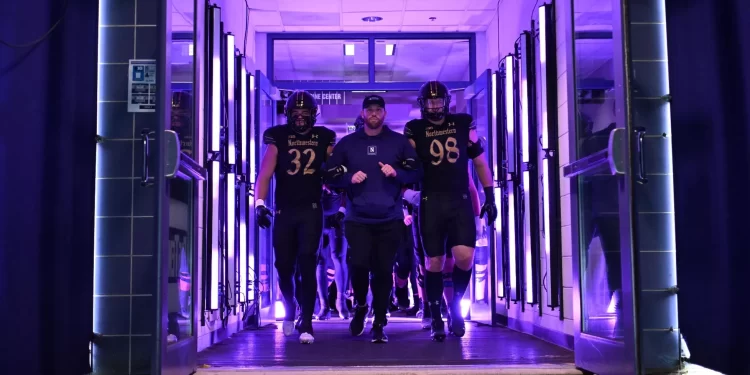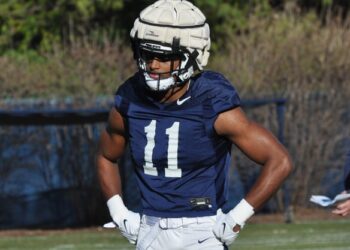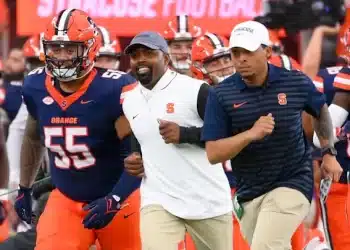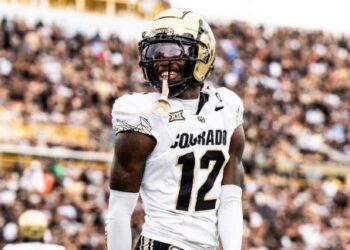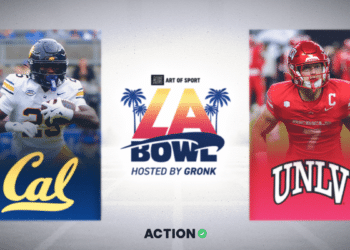By Bill Carroll
Northwestern University’s football history is fascinating, a journey filled with treks to dizzying high spires, breathtaking plummets into low valleys, plenty of character-building, and soul-shattering moments. Established in 1882, the Wildcats football program is one of the oldest in the country, although it wasn’t always among the powerhouses you may associate with Midwestern football. In fact, for much of its early history, Northwestern’s football team was more familiar with losing streaks than trophies, earning them the unfortunate moniker “Chicago’s Big 10 doormat” at times. Still, the Wildcats bit and scratched, embracing a gritty underdog identity in the rugged Big 10 Conference.
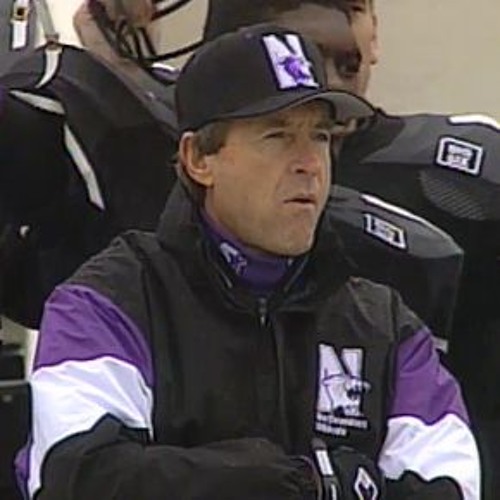
Northwestern Football: A New Hope
The rising action of the story began in the mid-1990s when head coach Gary Barnett took the reins and delivered one of the most miraculous turnarounds in college football history. After decades of mediocrity, the 1995 Wildcats stunned everyone by winning the Big 10 championship and earning a Rose Bowl berth, something Northwestern hadn’t done since 1949. That year, the Wildcats were the season’s Cinderella story, proving persistence pays off. They didn’t win the Rose Bowl, but their return to the national stage reinvigorated the program and Northwestern’s fans, who proudly adopted the chant “Expect Victory,” marking the end of being satisfied with simply competing.
Fast-forward to the 21st century, Northwestern was firmly planted as a respectable force in college football. Under the leadership of longtime head coach Pat Fitzgerald, a former Wildcats linebacker, the team has sharpened its blue-collar, never-surrender mentality. Year after year, the Wildcats have battled their way to bowl games and produced NFL-caliber talent, all the while, they were maintaining an elite academic standing.
Northwestern football may not always steal the spotlight, but when they do, it’s with a dash of heart, a lot of fight, and the kind of resilience that’s hard not to admire. Northwestern football rarely dominates the headlines, but until recently, when it did, it was fueled by heart, grit, and a stubborn resilience that made it nearly impossible not to root for them.
This combined to make the hazing scandal, a sad and unsettling end to the Fitzgerald era, all the more heart-rending.
Former players revealed to the student newspaper that the locker room was the site of disturbing, sexualized hazing rituals. One such activity, known as “running,” involved older players restraining a younger teammate while eight to ten others, dressed in various “Purge-like” masks would simulate sex acts by “dry-humping” the victim in the darkness of the locker room.
University President Michael Schill said that he believes he “may have erred in weighing the appropriate sanction for Coach Fitzgerald.” …“Coach Fitzgerald is not only responsible for what happens within the program but also must take great care to uphold our institutional commitment to the student experience and our priority to ensure all students, undergraduate and graduate, can thrive,” Schill wrote in the statement. “Clearly, he failed to uphold that commitment, and I failed to sufficiently consider that failure in levying a sanction. Via the Daily Nortwestern
The details were frankly sickening and shocking. In addition to costing Patrick William Fitzgerald Jr. the job of his dreams, as the head coach at his alma mater, it left The Wildcats without one of their program’s heroic linchpins and an icon. After, its previous coach went 110–101 with two Big 10 West titles and a five-win and five-loss bowl record. The shaken program turned to David Braun.
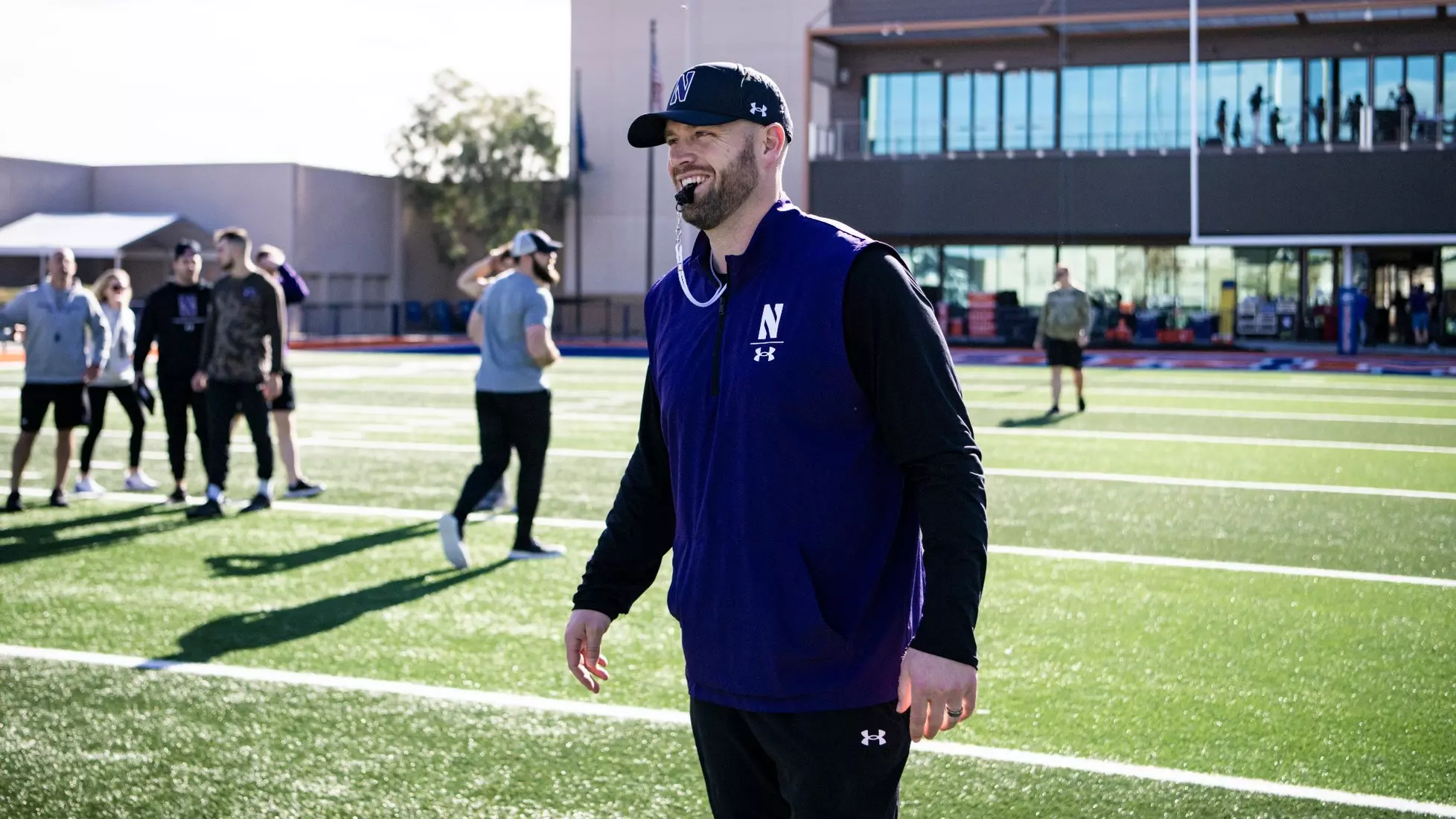
Braun wasted no time. In 2023 Northwestern was 8-5 and Braun was deservedly recognized. He received:
Braun’s eight wins tied for the most among the nation’s first-year head coach that season.
Northwestern Football: Focus, Future And Philosophy
David Braun’s coaching philosophy is deeply rooted in building a strong team culture, focusing on player development, and implementing a dynamic and adaptable football scheme. His approach reflects a commitment to holistic growth, on and off the field, emphasizing discipline, unity, and a relentless work ethic.
Scheme:
Braun’s coaching scheme is marked by flexibility and a mindset that seeks to exploit his players’ strengths. He often employs a defensive-minded approach, particularly with aggressive, pressure-oriented tactics. Known for crafting game plans that prioritize stopping the run and forcing turnovers, Braun’s defenses are designed to be fast and physical. He emphasizes fundamentals tackling, gap integrity, and relentless pursuit of the ball carrier. The offense is not his primary focus, however, Braun encourages a balanced attack, valuing efficiency and adaptability to opposing defenses.
Team Building:
At the core of Braun’s philosophy is his dedication to team building. He prioritizes a supportive, cohesive, family-like atmosphere where players trust one another and share a vision. His leadership style focuses on accountability and fostering leadership from within the team, allowing players to take ownership of their roles and responsibilities. Braun believes a team’s success stems from a unified commitment to a common goal. He puts maximum effort into cultivating strong relationships between coaches, players, and staff.
Player Development:
David Braun has built a reputation as a master of player development, transforming raw talent into finely-tuned athletes and well-rounded men, on and off the field. He doesn’t just coach to win; he tailors his techniques to unlock each player’s full potential, focusing on individual strengths and pushing them to new heights. Braun’s mission? To mold players who dominate the gridiron but are equally prepared to tackle life beyond football. His playbook emphasizes mental grit and resilience, challenging his players to embrace adversity and continue to strive for improvement.
At the heart of Braun’s philosophy is a commitment to shaping tough, disciplined teams with a relentless, aggressive defense. He values strong leadership inside the locker room and aims to cultivate a culture of accountability and excellence. For Braun, it’s not just about building great athletes, it’s about crafting individuals who thrive under pressure and lead by example.
His coaching staff reflects this no-nonsense, high-achievement approach. Braun surrounds himself with teachers, not just tacticians, coaches who understand that true greatness is hidden in the details, both on the field and in the classroom. With his staff, it’s about pushing the boundaries of what’s possible while keeping the mission laser-focused on excellence in all aspects.
Zach Lujan’s offensive philosophy is rooted in creativity, adaptability, and maximizing the strengths of his personnel. He’s a firm believer in a balanced attack that keeps defenses guessing, blending a dynamic passing game with a strong, physical ground game. Lujan is known for tailoring his schemes to fit the talent at his disposal, this means exploiting a quarterback’s mobility, unleashing a power running back, or opening up the field with a deep passing threat. His play-calling often features tempo changes and misdirection, keeping defenders on their heels and capitalizing on mismatches.
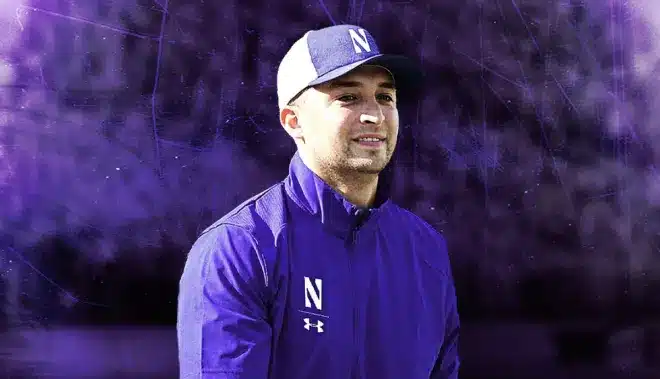
The Wildcat’s dynamic, young offensive coordinator, Zach Lujan’s offense thrives on execution and precision, emphasizing smart decision-making and limiting mistakes. He places high value on a multiplicity of schemes and personnel, favoring athletes who can create mismatches across the field and thrive in multiple roles. At its core, his system is designed to wear down opponents with a mix of strategic unpredictability and high-level execution, aiming for sustained drives that control the tempo and break down defensive stamina.
Armon Binns, wide receivers coach, played in the CFL and NFL after being a standout at the University of Cincinnati. He is young, but has varied experience and knows how to develop young receivers. Former terrific tackler Tim McGarigle chose to stay close to home and play for the Wildcats. While a linebacker, he shattered the school and FBS career tackle records, posing 545 total tackles at NU. That FBS record stood for more than a decade. After some time at Western Michigan, he returned to coach linebacker for his friend Pat Fitzgerald and excelled. He is now the defensive coordinator.
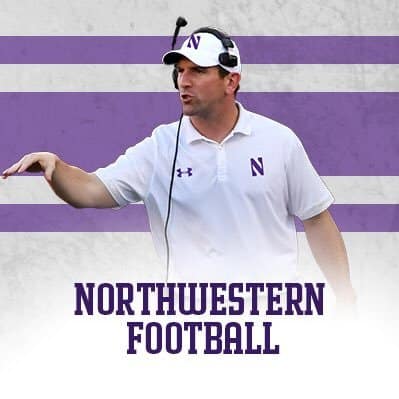
McGarigle’s coaching scheme is based on relentless aggression and an unyielding commitment to defensive dominance. As a linebackers coach and defensive coordinator, McGarigle prioritizes swarming to the ball, fast and physical play, and forcing offenses into uncomfortable situations. His approach hinges on creating chaos, blitzing from unexpected angles, disrupting passing lanes, and delivering punishing tackles. McGarigle’s style emphasizes discipline but is balanced on a fearless edge, pushing his players to attack every snap with intensity and precision. The goal? To suffocate the opponent’s offense and dictate the pace of the game with sheer, intellectual rigor married with sheer brutality.
The Future
Recruitment is one of the keys to a prosperous football future, as with California-Berkeley, military academies, Notre Dame, Rice, Stanford, Vanderbilt, and a very select few others, prospective student-athletes must accept the twin challenges of students at an elite academic institution, while playing football at the FBS level. The types of recruits who can balance these demands are fairly rare.
Sam Mulford, Director of Recruiting Operations, is finding a way to serve two demanding masters. Mulford’s recruitment strategy is locked on finding not just the most talented athletes, but those who embody the Wildcats’ blend of grit, intelligence, and character. Mulford looks for recruits who excel both on the field and in the classroom, emphasizing Northwestern’s unique academic-athletic balance. He targets players with high football IQs, a relentless work ethic, and the potential to develop into leaders within and beyond the team. Mulford also values versatility, seeking athletes who can adapt to multiple positions or schemes. This approach is built on relationships, cultivating strong bonds with recruits and their families, ensuring that every player Northwestern pursues fits the program’s culture of resilience, accountability, and excellence.
With a record of two wins and a loss, about to face the Washington Huskies, with an identical record, smarting from a narrow Apple Cup defeat, in Husky Stadium. This is a measuring stick game. To prevail, the Wildcats must win the struggle to control time of possession and avoid letting the Huskies’ pass rushers like Voi Tunuufi and Sebastian Valdez get rolling. On offense, Will Rogers, formerly of Mississippi State, was 23-for-31 for 314 yards, one touchdown, and no interceptions against Washington State. They have a 1-2 punch at running back, freshman Adam Mohammed, and human mini-fridge, the 5’9″ 229 junior, Jonah Coleman, at receiver Giles Jackson was the star of the Apple Cup with eight catches for a career-high 162 yards, plus a touchdown.
But the Huskies have flaws. In the Apple Cup, they committed 16 penalties for 135 yards and only converted on four of their 13 third-down attempts. If the Wildcats can control the game’s tempo, avoid giving up explosive plays, and win the turnover battle, the immediate future is quite bright.


 NFL
NFL